DEMOCRACY IN AMERICA?
What Has Gone Wrong and What We Can Do about It
BENJAMIN I . PAGE
MARTIN GILENS
The University of Chicago Press
Chicago and London
The University of Chicago Press, Chicago 60637
The University of Chicago Press, Ltd., London
2017 by The University of Chicago
All rights reserved. No part of this book may be used or reproduced in any manner whatsoever without written permission, except in the case of brief quotations in critical articles and reviews. For more information, contact the University of Chicago Press, 1427 E. 60th St., Chicago, IL 60637.
Published 2017
Printed in the United States of America
26 25 24 23 22 21 20 19 18 17 1 2 3 4 5
ISBN-13: 978-0-226-50896-2 (cloth)
ISBN-13: 978-0-226-50901-3 (e-book)
DOI: 10.7208/chicago/9780226509013.001.0001
Library of Congress Cataloging-in-Publication Data
Names: Page, Benjamin I., author. | Gilens, Martin, author.
Title: Democracy in America? : what has gone wrong and what we can do about it / Benjamin I. Page and Martin Gilens.
Description: Chicago ; London : The University of Chicago Press, 2017. | Includes bibliographical references and index.
Identifiers: LCCN 2017015527 | ISBN 9780226508962 (cloth : alk. paper) | ISBN 9780226509013 (e-book)
Subjects: LCSH: DemocracyUnited States. | United StatesPolitics and government21st century. | Pressure groupsUnited States. | Rich peoplePolitical activityUnited States.
Classification: LCC JK275.P344 2017 | DDC 320.973dc23
LC record available at https://lccn.loc.gov/2017015527
 This paper meets the requirements of ANSI / NISO Z39.48-1992 (Permanence of Paper).
This paper meets the requirements of ANSI / NISO Z39.48-1992 (Permanence of Paper).
CONTENTS
FIGURES
Average citizens have little or no influence on policy |
Even highly popular policies often fail |
Americans want higher spending on Social Security |
Affluent Americans have substantial influence on policy |
Congressional election spending has increased |
More campaign dollars come from the biggest donors |
Interest groups have substantial influence on policy |
Congressional productivity has declined since the mid-twentieth century |
The parties in Congress now show little to no overlap |
Congress has become increasingly polarized |
The filibuster has become more common in the twenty-first century |
How the majority of the majority can be a minority |
Outside spending has skyrocketed |
TABLES
Policy preferences of multimillionaires vs. average citizens |
More Democracy
Today the United States faces a number of daunting problems. Economic inequality has reached levels not seen for a hundred years. While the wealthy keep piling up riches, many Americans are hurting from job losses, low wages, high health-care costs, and deteriorating public services. Whole communities have been devastated by factory closings. Our public schools are neglected. Our highways and bridges are in disrepair.
Well-designed government policies could help deal with these problems. Large majorities of Americans favor specific measures that would be helpful. Yet our national government often appears to ignore the wants and needs of its citizens. It pays more attention to organized interests than to ordinary Americans, and it gets bogged down in gridlock and inaction.
No wonder many Americans are angry and alienated. No wonder there have been populist rebellions on both the Left and the Right: the Tea Party, Occupy Wall Street, Bernie Sanders, Donald Trump.
In this book we argue that gridlock and inaction in Washington result from two main causes: clashes between our two sharply divided political parties and obstructive actions by corporations, interest groups, and wealthy individuals. The many veto points in our complex political system (that is, the many opportunities for one or another political actor to thwart policy change) are used to prevent the enactment of policies that most Americans want.
The nonresponsiveness and dysfunction of government are closely related to undemocratic features of our political system. Our laws and institutions make it hard for ordinary citizens to have an effective voice in politics. They permit corporations, interest groups, and the wealthy to exert a great deal of influence over what the government does. And they allow donors and highly ideological political activists to dominate the parties nominations of candidates for office, so that the two parties are pushed in sharply contrasting directionscontributing to gridlock. Both parties often stray from what majorities of Americans want them to do.
It follows that our problems can be more effectively addressed if we reform our political system to achieve more democracy: more equal opportunity for all citizens to shape what their government does and policies that better address the needs of all Americans.
If the political parties are democratized, for example, so that each of them is forced to appeal more to the voters and less to the partys donors and activists, they will differ less sharply from each other. That will reduce gridlock. Both parties will be more responsive to the citizenry and more likely to adopt solutions that Americans favor for the problems we face.
Similarly, if we reform elections so that all citizens have an equal voice, and if we mute the influence of political money and organized interests, public officials will more faithfully reflect what ordinary Americans want.
Again, if the Congress and other political institutions are reformed to represent all citizens equally, those institutions will be more harmoniousless prone to clashes with each other that result in gridlockand more responsive to the citizenry as a whole.
Some impediments to democracy have been with us for a long time. Others have grown worse in recent years. But most, we think, are fixable.
In the course of American history, the health of democracy and the extent of economic equality have tended to rise and fall together. Each has affected the other. In the late nineteenth-century Gilded Age, for example, extreme inequalities of income and wealthinequalities not unlike those that afflict us todayempowered the wealthy few and undermined democracy. Yet that same extreme economic inequality provoked protests and social movements, which in turn helped bring about reforms that advanced both political and economic equality. Through such efforts, the United States has enjoyed periods of relatively democratic, harmonious, and effective government, and widely shared prosperity.
We believe that we can once again enjoy more vigorous democracy and more widely shared prosperity, if enough citizens mobilize and work hard for effective reforms that promote both economic and political equality. The two types of reform go together. Each facilitates the other. Neither is likely to get very far alone.
In the following chapters we show precisely how undemocratic U.S. government policy making has become. We do our best to diagnose exactly what has gone wrong. Based on that diagnosis, we explain how certain specific political reforms could greatly increase democratic responsiveness. Finally, we explore how the formidable obstacles to reform might be overcome.

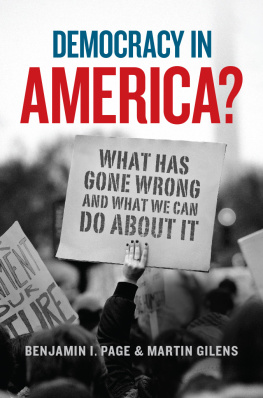
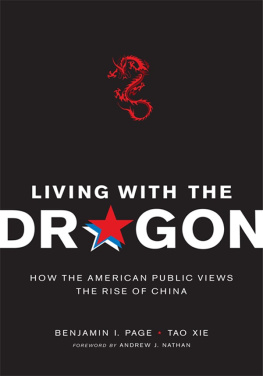
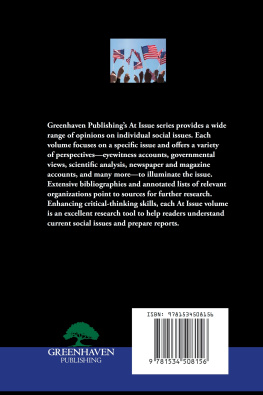

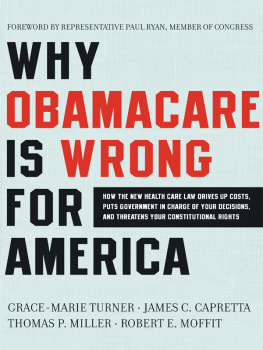
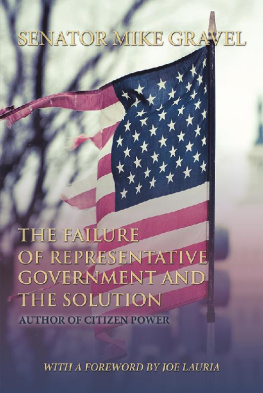
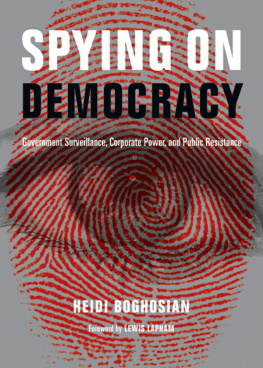
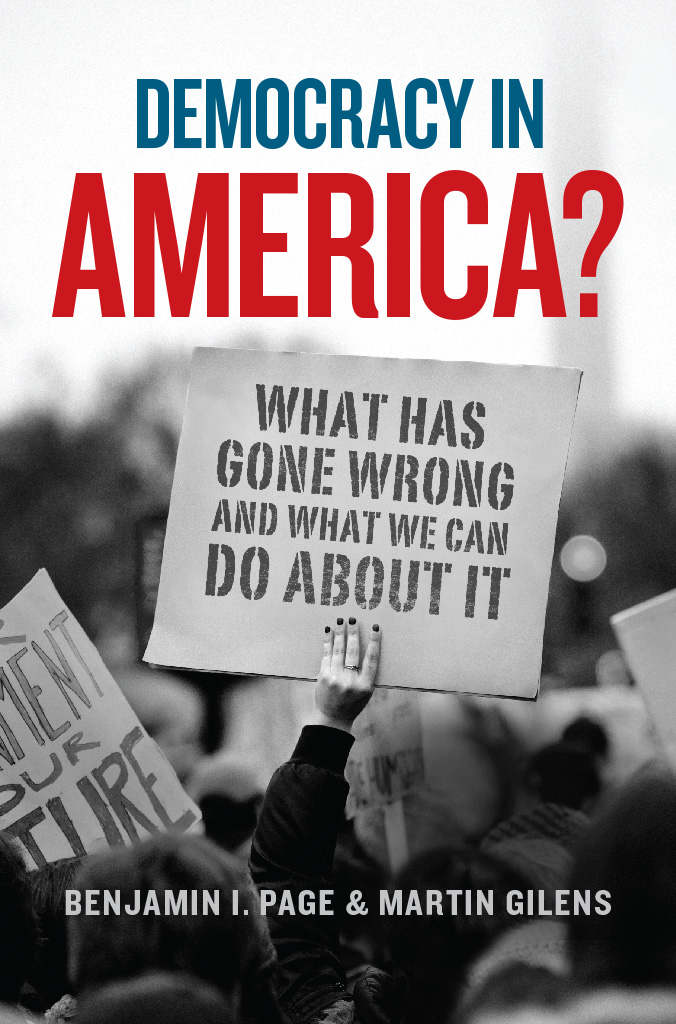
 This paper meets the requirements of ANSI / NISO Z39.48-1992 (Permanence of Paper).
This paper meets the requirements of ANSI / NISO Z39.48-1992 (Permanence of Paper).